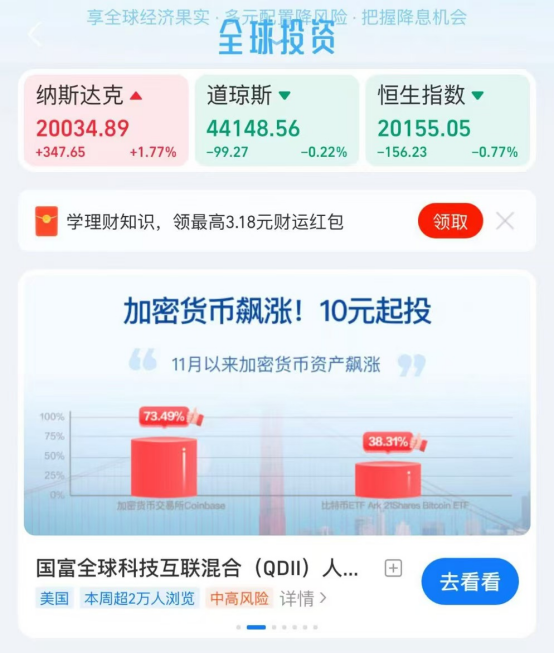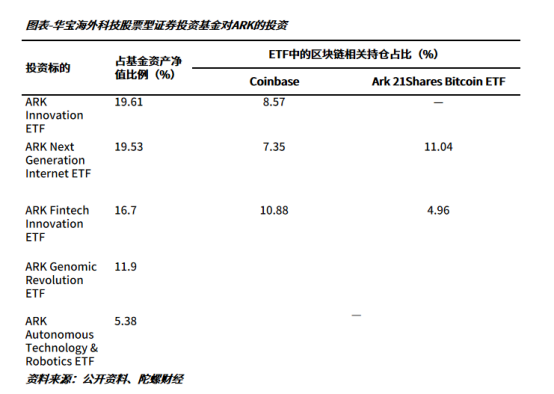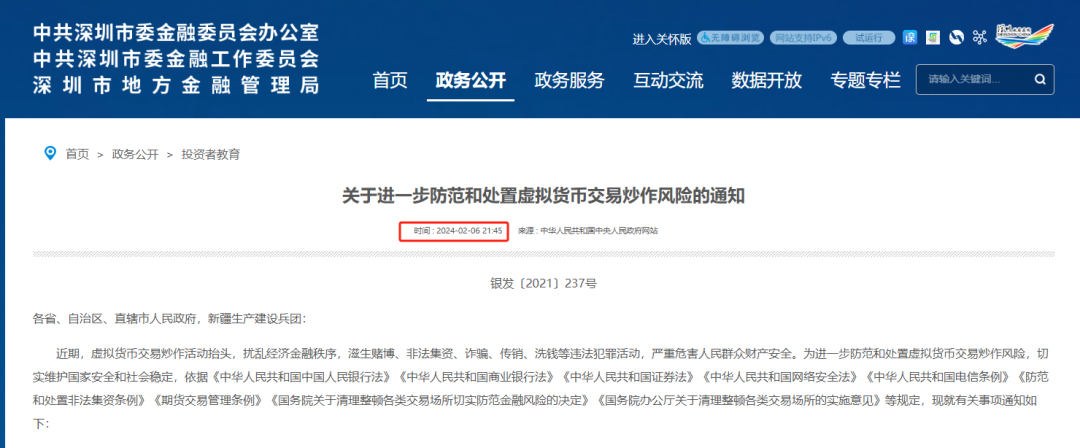The news was up and down. After a series of spikes and repairs, Bitcoin finally returned to above $100,000. At the end of the year, the market once again focused on the actions of the Federal Reserve. The market was eagerly looking forward to it, but Alipay, at this time, brought a little shock to the industry.
On December 12, according to Wu Blockchain, community users reported that some mainland Chinese users recently received cryptocurrency fund promotion advertisements on the Alipay Fund homepage, with the content showing "global investment, cryptocurrency soaring, 10 yuan investment, get on board now." After verification, the fund was Huabao Overseas Technology C (QDII-FOF-LOF), which has a limit mechanism, and each person is limited to purchasing 1,000 yuan per day.
After receiving this message, I also checked Alipay, but the recommendation mechanism was unclear. I did not receive any promotion from this page, but another colleague found an advertisement for crypto funds on the "Global Investment" interface of the Alipay fund section. In addition, Huabao's products are sold normally on multiple fund distribution platforms in the industry except Ant Fortune, and there are also related displays on Wealth Management and China Merchants Bank. Crypto funds seem to be more than just Huabao Overseas Technology C, and the interface also recommends Guofu Global Technology Internet Hybrid (QDII).

This move quickly sparked heated discussions in the industry. Does this mean that the mainland is relaxing its policy?
Further analysis of Huabao and Guofu shows that both are affiliated with QDII, or Qualified Domestic Institutional Investors. QDII is a system implemented in my country since 2006. It refers to an arrangement that allows domestic institutions to invest in stocks, bonds and other securities in overseas capital markets in a controlled manner, with the approval of relevant departments, under the conditions that the RMB capital account is not convertible and the capital market is not open, and is established within a country.
In other words, due to my country's strict foreign exchange management system, domestic investors cannot directly invest in overseas capital markets, but through the establishment of QDII, domestic investors can use it as a medium to invest in overseas markets. The two major crypto funds can deploy overseas assets because they have been granted this qualification.
In addition to QDII, there are also FOF-LOF after Huabao Overseas Technology C. FOF refers to a fund with funds as the main investment target, and LOF refers to a listed open-end fund, which means that investors can not only subscribe and redeem at fund sales institutions, but also trade at market prices on the stock exchange. In this way, Huabao Overseas Technology C is an open-end fund that can be traded through exchanges and invests in overseas funds.
The form is very similar, and the reality is also very similar, it is just a shell from retail investors to the upper levels. In summary, domestic retail investors can indirectly participate in overseas asset investment by investing in the above-mentioned QDII funds and then using QDII funds as the main body for overseas layout. In plain words, users invest funds in funds, and fund managers use the funds to buy overseas assets, and overseas assets include crypto assets, so that the purchase of regulated crypto assets is completed in a compliant manner.
The disclosure report also confirms this point. According to the Q3 2024 report of Huabao Overseas Technology Equity Securities Investment Fund (QDII-LOF), in the investment strategy column, it is written that "this fund mainly invests in overseas technology-themed funds (including ETFs) and ultimately invests in stocks that use technology as a support for the long-term development of enterprises."
In terms of asset allocation, 87.5% of the fund is invested in funds, 8.9% is invested in bank deposits and liquidation reserves, and the remaining 3.6% is other assets in the asset portfolio. The question is, since encryption is the selling point, what is the investment proportion of encryption assets in the fund?
In the core fund investment business segment, more detailed investment details provide an answer to this question. Among the top ten funds ranked by the proportion of fair value to net asset value of the fund, five are ARK ETFs under Wood Sister, accounting for 73.11%. If we continue to penetrate, ARK ETF's holdings include Coinbase and its own Bitcoin spot ETF Ark 21Shares Bitcoin ETF. In this way, Huabao has achieved indirect investment in encryption through layers of nesting dolls. In terms of total volume, Huabao Overseas Technology's investment includes about 4.93% of Coinbase stocks and 2.98% of Ark 21Shares Bitcoin ETF, totaling 7.92%.

The latest fund size of Huabao Overseas Technology C is only 406 million yuan, and the proportion of real investment in crypto assets is even less, which is quite a false pretense. Alipay has also set a limit on the fund, and each person can only purchase 1,000 yuan per day. Unlike Huabao, Guofu mainly focuses on stocks. There is no blockchain in its top ten quarterly disclosures. Even in the 36 equity holdings in the mid-term report, there is no blockchain company, which shows that the actual investment proportion of crypto is very small. It can be seen that no matter in terms of amount or proportion, crypto assets are not dominant, and it is more that the fund itself uses crypto assets as a hot gimmick for publicity and hype.
In terms of performance, Huabao Overseas Technology C has basically outperformed the market, achieving a 25.02% net value growth this year, 9 percentage points higher than the 16.25% of the CSI 300. The best growth performance in the past three months, with a net value growth of 29.23%. Of course, if compared with directly holding Bitcoin, it is obviously far from it, and the fund also has a 1% management fee and a 0.2% custody fee, so the holding cost is relatively higher.
But for the mainland with clear regulations, this does open up a loophole for investors, allowing them to have a legal and compliant channel to hold cryptocurrencies indirectly. Alipay's direct advertising promotion also allows more investors to access such assets. For the industry, even if it is just fund promotion and hype, it has positive significance.
On the other hand, given the important position of Alipay in my country's industry, some people have speculated whether this is a precursor to the mainland's liberalization.
The speculation is not groundless. After all, as the mainstreaming of Bitcoin accelerates, many countries have noticed crypto assets and even use BTC as national reserves. In fact, since Hong Kong issued the virtual asset declaration, rumors about my country's lifting of the ban on virtual currencies have emerged one after another. In July this year, Galaxy Digital General Manager Mike Novogratz mentioned that my country would lift the ban in the fourth quarter.
Recently, Zhao Changpeng reiterated at the Bitcoin MENA conference held in Abu Dhabi that although China's position in the field of cryptocurrency is vague and uncertain, the trend of building Bitcoin reserves is "inevitable". When the United States begins to really build Bitcoin reserves, it is likely to trigger other countries to follow suit. China must do the same at some point because Bitcoin is the only "hard asset". He also believes that according to China's national conditions, if it is to be implemented, China is likely to choose to secretly hoard Bitcoin on a large scale first, and then formally announce its strategic plan to the outside world at the appropriate time.
Judging from the global recognition of Bitcoin and the regulatory trends of major countries, cryptocurrencies seem to have a chance to be relaxed. However, judging from the current regulatory structure in my country, it is too early to talk about relaxation.
From this year's perspective, the consistency of my country's regulatory policy on virtual currency has not changed. It has only improved the regulatory framework around this thing, such as including "virtual asset" transactions in money laundering methods, and conducting in-depth research to improve the disposal process and case handling of virtual currency. If you pay attention, when the crypto market recovered this year, many places also re-issued the "Notice on Further Preventing and Dealing with Virtual Currency Trading Speculation Risks" issued by 10 departments including the People's Bank of China, the Cyberspace Administration of China, the Supreme People's Court, and the Supreme People's Procuratorate in 2021 in the investor education section. Taking the Shenzhen Local Financial Administration as an example, it first issued a notice in February, and then re-issued the "Risk Warning on Virtual Currency Trading Speculation" in June.

Interestingly, the notice clearly states that "Internet companies are not allowed to provide online business premises, commercial displays, marketing and promotion, paid traffic diversion and other services for virtual currency-related business activities. Any clues of illegal and irregular problems should be reported to the relevant departments in a timely manner, and technical support and assistance should be provided for related investigations and investigative work." Although the legal risks can be basically eliminated after layers of shelling, Alipay, which has always been cautious, may also have a certain degree of public opinion risk in promoting the fund.
In the mainstream media, there seems to be no sign of virtual currency being liberalized. The mainstream media still has a relatively negative attitude towards crypto assets such as Bitcoin. Even though the price of Bitcoin has exceeded $100,000, Xinhua News Agency’s article “The US Financial Ecology and Risks Behind the Bitcoin Rush” still uses words such as “greedy capital and blind investors” to warn of risks.
In fact, even if we do not consider other issues such as energy consumption, security risks, market fairness, etc. of cryptocurrencies, under the current strict foreign exchange control in my country, considering only the impact of digital currencies on sovereign currencies and the unique anti-censorship nature of decentralized currencies, it can only be described as a fantasy to fully liberalize virtual currencies.
The attitude of the current central bank governor Pan Gongsheng has also made this goal more difficult. As early as 2017, he was a well-known opponent of cryptocurrency. He once said at the time, "As Keynes told us, the irrationality of the market can last long enough to bankrupt you. Therefore, there is only one thing you can do, sit by the river and watch. One day, the corpse of Bitcoin will float past you."
In fact, from a regulatory perspective, there are currently no strong supporters of encryption in the political arena. Even Yao Qian, who was previously hailed as "the government official who understands blockchain best" and "the person who understands digital currency best in China," was expelled from the party and removed from public office last month. He was even accused of using virtual currency for power-for-money transactions in a published approval document.
To some extent, banning virtual currencies may be a politically correct move in my country at this stage. Of course, it is difficult to fully liberalize, but it is not difficult to partially lift the ban. And there is still a long time to go. If the United States really lists Bitcoin as a strategic reserve, whether the attitude of the top leaders will change accordingly is still unknown.
However, from the current perspective, indirect investment is at least a way of investment for investors who are relatively lacking in virtual currency knowledge. In the context of Hong Kong's liberalization, it is foreseeable that more flexible investment channels suitable for Chinese investors will emerge in the future.





